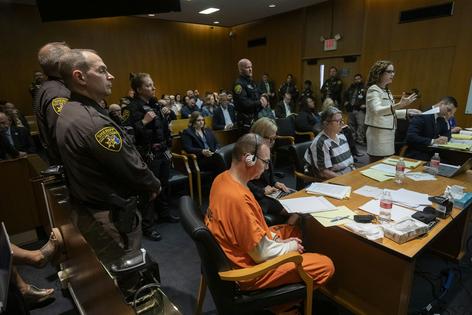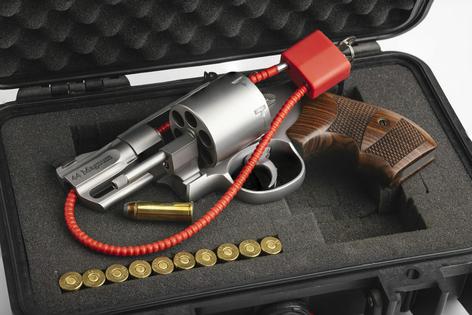What parents in Michigan – and everywhere – should know about secure gun storage after the Crumbley convictions
Published in Political News
During the recent trial of James Crumbley, the father of the Oxford, Michigan school shooter, prosecutor Karen McDonald demonstrated the use of the cable lock that federal law mandates sellers provide with the 9 mm handgun used in the mass shooting.
Installing the lock took about 10 seconds.
Had Crumbley or his wife, Jennifer Crumbley, used the cable lock, the simple act of securing the weapon might have saved four teenagers’ lives, spared seven others from being shot and avoided traumatizing many more people. It also might have prevented their 15-year-old son from becoming a murderer and being sentenced to spend the rest of his life in prison.
In the end, James and Jennifer Crumbley were both convicted of involuntary manslaughter and sentenced to prison because their actions enabled their son to access the handgun he used to kill his classmates.
We are professors of public health and the law who study how to limit gun violence in American homes, schools and communities. Currently, we are collecting data about how well common tactics – from social emotional learning and behavioral threat assessment to metal detectors and security cameras – work to make school buildings safe.
Some commentators have applauded the Crumbley verdicts, suggesting that they will encourage parents to be more careful, with others wondering if the result presages a new wave of parental convictions.
We believe the results will be more muted. Here’s why:
While the verdict illustrates the importance of limiting children’s access to firearms to keep communities safe, holding parents responsible is not new.
U.S. law, through both statutes and court decisions, has long imposed on parents an obligation to protect others from the harms their children might inflict, and ensuring that children do not have access to firearms is part of this duty.
This responsibility covers both a child’s civil harms and their criminal acts, either of which may involve property damage or injuring a person.
Historically, these parental responsibility laws included prohibitions against contributing to the delinquency of a minor, which have been part of state criminal codes since the early 20th century.
The most recent wave of laws were introduced in the 1980s and 1990s in response to a rise in youth gun violence, much of it fueled by adolescents’ access to firearms during the crack cocaine epidemic.
The Crumbley parents’ cases fit within this legal tradition. What is unique, however, is that they were charged with more serious and more substantive crimes. Why? Likely due to the unusual and, one hopes, utterly unique circumstances of the case.
Even while school safety advocates celebrate hard-earned reductions in bullying, fights and even weapons brought to school, school-related shootings have increased over the past 10 years in both frequency and severity.
By one estimate, over 80% of firearms used in school shootings come from the home of the shooter’s parents or relatives. Kids are aware of firearms in their homes and can access them more easily than parents think.
The unfortunate truth is that even though safety is the most common reason Americans cite for keeping a firearm at home, without proper precautions firearms can be among the greatest dangers to children.
When it comes to serious injury and death among children and teens, firearms are more dangerous than cars, abduction, drugs or disease – all those harms we parents worry so much about.
Safe storage options can make homes safer for children without restricting firearm access for self-defense purposes. Beyond cable locks, trigger locks, gun safes, lock boxes and disassembling firearms are other easy and affordable ways to prevent unintended access by children.
In part due to the Oxford high school shooting, in 2023 the state of Michigan enacted a law which mandates that individuals store firearms in a way that is inaccessible to children.
Under this new law, adults can be charged with a misdemeanor if a child gains access to a firearm that they improperly stored. However, if the child injures or kills someone with the firearm, adults can be charged with a felony crime that carries a potential prison sentence. Importantly, this statute applies to all households, even those where children do not live but only visit.
The Michigan law is not alone in its approach. Currently, 26 states and Washington D.C. have laws that mandate the safe storage of firearms and impose criminal penalties for failure to comply.
These laws are in place to encourage responsible firearm ownership, which includes keeping children safe from firearms. In Michigan, legislators expressed their hope that the law will encourage more responsible behavior.
The Crumbley verdicts could lay the groundwork for how other parents who fail to secure their firearms might be charged if their child commits a shooting. At least two other recent cases involve parents who were criminally charged when they allowed their child access to a firearm that was used in a shooting.
It is unlikely, however, this will become the norm. In each of these cases, the facts were extreme. The parents either took no action to prevent access to a gun or actually acted to facilitate the child’s access to the weapon.
Fear of a fine or imprisonment is also unlikely to be what will drive parental behavior. At the end of the day, most parents want to keep their children and others safe. Finding a solution that works for families is possible – securely storing a firearm is fast, easy and cheap.
Think it over: 10 seconds could make all the difference.
This article is republished from The Conversation, a nonprofit, independent news organization bringing you facts and trustworthy analysis to help you make sense of our complex world. It was written by: Justin Heinze, University of Michigan; April M. Zeoli, University of Michigan, and Frank E. Vandervort, University of Michigan
Read more:
Americans used to unite over tragic events − and now are divided by them
Landmark US prosecution of parents for son’s shooting of students creates legal precedent – an expert explains
Five years after Parkland, school shootings haven’t stopped, and kill more people
Justin Heinze receives funding from the Bureau of Justice Assistance, the National Institutes of Health, the Centers for Disease Control, and the Michigan Department of Health and Human Services.
April M. Zeoli has received funding for her research from the Centers for Disease Control and Prevention, the National Institutes of Health, the Joyce Foundation, the National Collaborative on Gun Violence Research, and the MacArthur Foundation. She is affiliated with the National Resource Center on Domestic Violence and Firearms as a research expert.
Frank E. Vandervort is affiliated with the American Professional Society on the Abuse of Children.
































































Comments